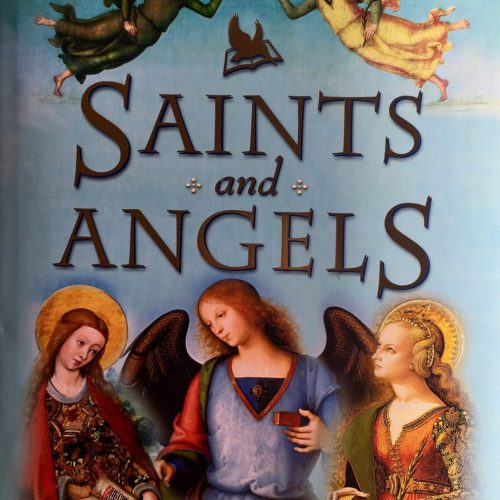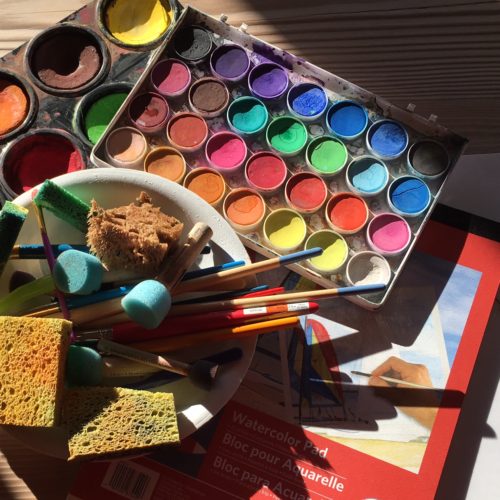
“God is love…”
“Whoever is without love does not know God, for God is love.”
Source: USCCB.org 1 John, chapter 4
For Parents to Teach to Their Children
Jesus Taught Us–Matthew 22:37
“You shall love the Lord, your God, with all your heart, with all your soul, and with all your mind.”
In my church, children in second and third grade CCD classes will be making their First Reconciliation in February. Parents are the teachers of their children, and I am available for questions. As a Reconciliation teacher, via ZOOM, I am helping the children practice their prayers but more importantly, helping them understand that First Reconciliation is not a test. Memorizing “An Act of Contrition” is important, but the real essence of the experience will be the child coming to Jesus and receiving the gift of forgiveness. Please talk to your child about the Sacrament explaining to them, that Reconciliation is a gift from God, put into action by Jesus.
“A sacrament is an outward sign instituted by Christ to give grace.”
Source: YourCatholicGuide.com
Our Art Gallery
“The Virgin Mary…believed by many to be the greatest of all the Christian saints.”
Source: Catholic.org

Our Prayers
This week, please read the “Nicene Creed” out loud with your children. Read it slowly, line for line, explaining the meaning and significance of the lines to your children. It explains what we believe in as Catholics. If possible, read this each day this week to help your children learn the prayer.
“The Nicene Creed” is a profession of our faith and is a prayer. It states the core beliefs of the Catholic Church.
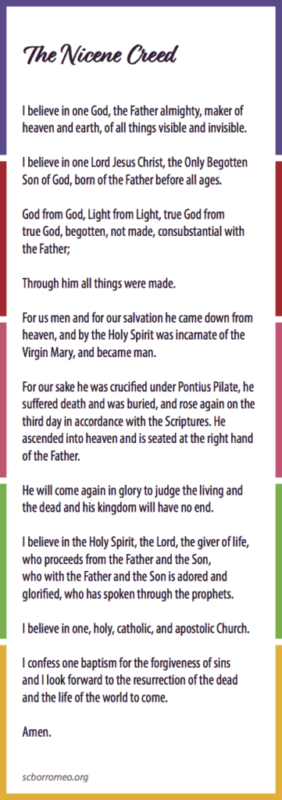
Act of Charity
O my God,
I love you above all things
with my whole heart and soul
because you are all good and worthy of all my love.
I love my neighbor as myself for the love of you.
Source: A Missal for Children “In the Evening” Page 85
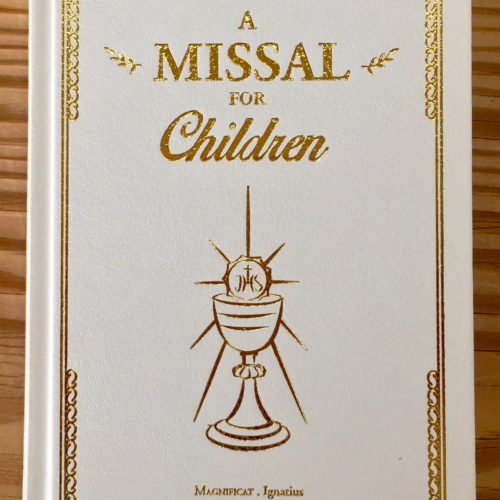
What is a Saint?
“A Saint is a Friend of God who Lives with God in Heaven.”
Source: Catholic.org
Please Read and Discuss with Your Children
A saint is a person, a human being, just like all of us. A saint may be a man or a woman; a young person or an old person; a person from any country or continent on earth. They have lived, made mistakes, at times made bad choices and sinned. At some point in their lives, however, a person who has received the sanctifying grace of God through faith in Christ, and most especially in the sacrament of baptism, repented for their wrong doings, changed their path, and has gone on in life to do amazing things to help other people and to serve God, can become a saint. A saint is different from an angel, because an angel is a spirit, and a saint is an exceptional human whom God has sanctified through grace, and whom the Church has recognized as having lived a life of heroic virtue. Saints live with God in the Communion of Saints in heaven. The Blessed Virgin Mary is the greatest saint who ever lived, because by a unique grace, God preserved her from the stain of Original Sin from the moment of her conception in the womb of her mother, St. Anne. The Blessed Virgin was not only conceived free from the stain of Original Sin, but she also never committed any personal sin during her earthly life.
Saint Francis of Assisi
The Feast of Saint Francis of Assisi is Celebrated on Sunday, October 4, 2020.
“Saint Francis gave up a life of wealth and comfort to help and care for the poor. He is a profoundly popular saint, particularly with children, and is fondly remembered for his love of animals and all God’s creations.”
Saints and Angels
Source: Saints and Angels, page 40.
Peace Prayer of Saint Francis of Assisi
“Lord, make me an instrument of your peace.
Where there is hatred, let me bring love.
Where there is offense, let me bring pardon.
Where there is discord, let me bring union.
Where there is error, let me bring truth.
Where there is doubt, let me bring faith.
Where there is despair, let me bring hope.
Where there is darkness, let me bring your light.
Where there is sadness, let me bring joy.
O Master, let me not seek as much
to be consoled as to console,
to be understood as to understand,
to be loved as to love,
for it is in giving that one receives,
it is in pardoning that one is pardoned,
it is in dying that one is raised to eternal life.”
The Solemnity of All Saints, November 1, 2020
Source: USCCB.org. Matthew, chapter 5:3-12 “The Beatitudes”
“When Jesus saw the crowds, he went up the mountain,
and after he had sat down, his disciples came to him.
He began to teach them, saying:
‘Blessed are the poor in spirit,
for theirs is the Kingdom of heaven.
Blessed are they who mourn,
for they will be comforted.
Blessed are the meek,
for they will inherit the land.
Blessed are they who hunger and thirst for righteousness,
for they will be satisfied.
Blessed are the merciful,
for they will be shown mercy.
Blessed are the clean of heart,
for they will see God.
Blessed are the peacemakers,
for they will be called children of God.
Blessed are they who are persecuted for the sake of righteousness,
for theirs is the Kingdom of heaven.
Blessed are you when they insult you and persecute you
and utter every kind of evil against you falsely because of me.
Rejoice and be glad,
for your reward will be great in heaven.’”
“Who will bring us true happiness?” from MagnifiKid! Vol. 17. Part 12. Section 2 Page 3
“In the Beatitudes, Jesus gives us the recipe for holiness and true happiness. Psalm 40 sums up the message of the Beatitudes when it says, “Happy are those who trust in the Lord.” Like the saints we honor today, we can put our faith in the Lord and follow his way.”
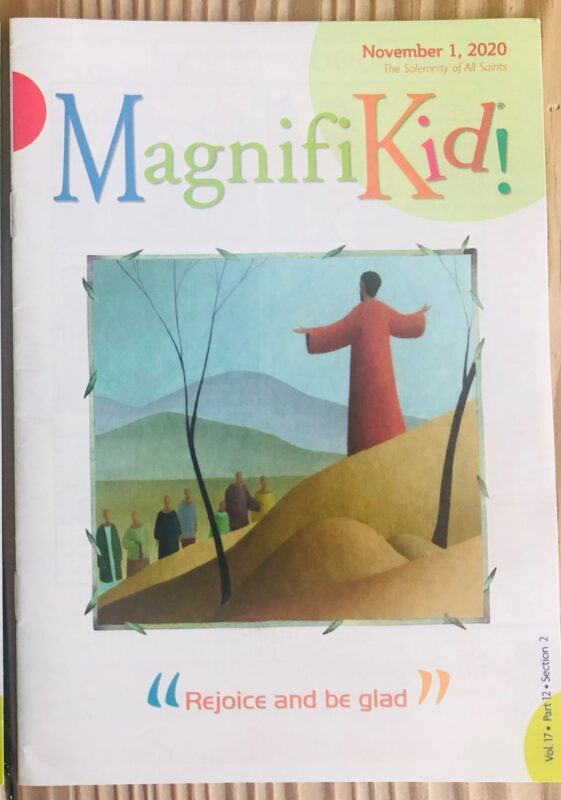
The Beatitudes for Children

Readings on the Soul for Grown-Ups
II. “BODY AND SOUL BUT TRULY ONE”
362 The human person, created in the image of God, is a being at once corporeal and spiritual. The biblical account expresses this reality in symbolic language when it affirms that “then the LORD God formed man of dust from the ground, and breathed into his nostrils the breath of life; and man became a living being.”229 Man, whole and entire, is therefore willed by God.
363 In Sacred Scripture the term “soul” often refers to human life or the entire human person.230 But “soul” also refers to the innermost aspect of man, that which is of greatest value in him, 231 that by which he is most especially in God’s image: “soul” signifies the spiritual principle in man.
364 The human body shares in the dignity of “the image of God”: it is a human body precisely because it is animated by a spiritual soul, and it is the whole human person that is intended to become, in the body of Christ, a temple of the Spirit:232
Man, though made of body and soul, is a unity. Through his very bodily condition he sums up in himself the elements of the material world. Through him they are thus brought to their highest perfection and can raise their voice in praise freely given to the Creator. For this reason man may not despise his bodily life. Rather he is obliged to regard his body as good and to hold it in honor since God has created it and will raise it up on the last day. 233
365 The unity of soul and body is so profound that one has to consider the soul to be the “form” of the body:234 i.e., it is because of its spiritual soul that the body made of matter becomes a living, human body; spirit and matter, in man, are not two natures united, but rather their union forms a single nature.
366 The Church teaches that every spiritual soul is created immediately by God – it is not “produced” by the parents – and also that it is immortal: it does not perish when it separates from the body at death, and it will be reunited with the body at the final Resurrection.235
367 Sometimes the soul is distinguished from the spirit: St. Paul for instance prays that God may sanctify his people “wholly”, with “spirit and soul and body” kept sound and blameless at the Lord’s coming.236 The Church teaches that this distinction does not introduce a duality into the soul.237 “Spirit” signifies that from creation man is ordered to a supernatural end and that his soul can gratuitously be raised beyond all it deserves to communion with God.238
368 The spiritual tradition of the Church also emphasizes the heart, in the biblical sense of the depths of one’s being, where the person decides for or against God.239
Source: The Catechism of the Catholic Church
An Explanation of “Our Soul”–Please read and discuss with your children
God made us in his image and likeness, and this image and likeness of God refer to our spiritual nature—our soul. But human beings are not just spirits, like God and the angels; rather, we are a union of body and spiritual soul. Because bodies are made of matter (physical things that we can see, touch, feel, etc.) they can die; but the human soul, which is not made of matter (it is spiritual like God and the angels), never dies. God is pure Spirit, but we have both a body and a spiritual soul (we straddle the line between the animal and the spiritual worlds). Sometimes people think of our heart as our soul, but the soul is actually united with the whole body. Our soul is where we have the spiritual abilities of knowledge and love, like God and the angels, but unlike the rest of the animal world which can neither know the good, nor love and choose it. When we die, our body passes away, but our soul does not. After we die, the souls of those who die in God’s friendship and grace enter heaven (or purgatory, waiting to enter heaven as their souls are purified from the effects of sin). In heaven, all blessed souls who are separated from their bodies wait for the Resurrection of the body in the second coming of Christ, in which our souls will be rejoined with our risen bodies, and we will be “in communion with God” in both body and soul.
Celebrating the Soul in Song–“How Great Thou Art” From The Best of the Priests
Readings for Children
An Excerpt from MagnifiKid! October 25, 2020 “Spread love by loving your neighbor”

Parents, please read this to younger children. It is an invitation to know Jesus.
“Nothing is impossible for God” By Lisa Reno, Page 3 Vol. 17. Part II. Section 5
“Make an effort to put Jesus’ commandment of love into practice. Look for every possible occasion you can find to bring happiness to those you love and to be nice to those people you don’t like quite as much.”
Our Writing Project
This week, invite your child to make a “mini poster” for their room so that they can reflect upon the meaning of their “soul.” Invite them to decorate a small piece of white watercolor or drawing paper and write the word “SOUL” across the page. Encourage them to decorate the paper as they wish. I used liquid watercolors and a small paint brush on a quarter page of watercolor paper. I used the “Liturgical Colors” to reinforce the child remembering what they are–green, lavender, white, gold, red and rose. My painting was mounted on green construction paper.

Our Art Project–All Saints’ Day Watercolor Painting
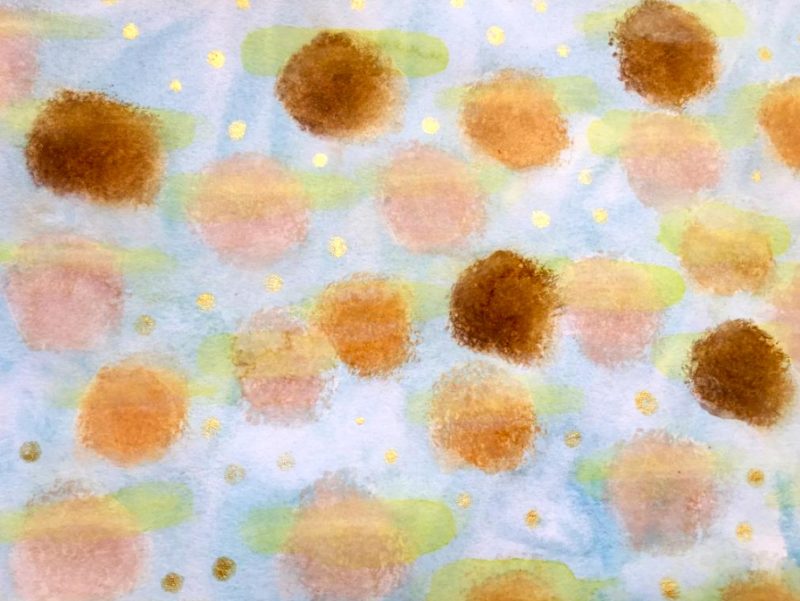
For this painting, I used cake watercolors on watercolor paper, although liquid watercolors are great, too. I painted the blue sky background first with a synthetic paintbrush. I like this type of brush because no hairs fall out on the painting, as with a traditional fur paint brush. The round sponge on a stick seen below is how I made the “saints'” heads. The yellow halos were made by a medium size brush, and I used a Q-Tip for making the gold dots.
Our Materials
Suggested Homework Activities–Week Eight
Please read with your child:
USCCB.org Luke, chapter 19, “Zacchaeus the Tax Collector.”
“At that time, Jesus came to Jericho and intended to pass through the town.
Now a man there named Zacchaeus,
who was a chief tax collector and also a wealthy man,
was seeking to see who Jesus was;
but he could not see him because of the crowd,
for he was short in stature.
So he ran ahead and climbed a sycamore tree in order to see Jesus,
who was about to pass that way.
When he reached the place, Jesus looked up and said,
‘Zacchaeus, come down quickly,
for today I must stay at your house.’
And he came down quickly and received him with joy.
When they all saw this, they began to grumble, saying,
‘He has gone to stay at the house of a sinner.’
But Zacchaeus stood there and said to the Lord,
‘Behold, half of my possessions, Lord, I shall give to the poor,
and if I have extorted anything from anyone
I shall repay it four times over.’
And Jesus said to him,
‘Today salvation has come to this house
because this man too is a descendant of Abraham.
For the Son of Man has come to seek
and to save what was lost.’
Please talk to your child about “making amends” for things we have done that we feel badly about–being unkind; using bad language, quarreling with a family member, etc. How can we make up for things we wish we hadn’t done or said?
Help your child with the definition of “salvation.” (Hint–being saved, saved)
“Called to beatitude but wounded by sin, man stands in need of salvation from God. Divine help comes to him in Christ through the law that guides him and the grace that sustains him:
- “Work out your own salvation with fear and trembling; for God is at work in you, both to will and to work for his good pleasure.1″
- Source: Catechism of the Catholic Church
“The redemption of human nature in and through Christ.” Source: Fr. William Goldin


